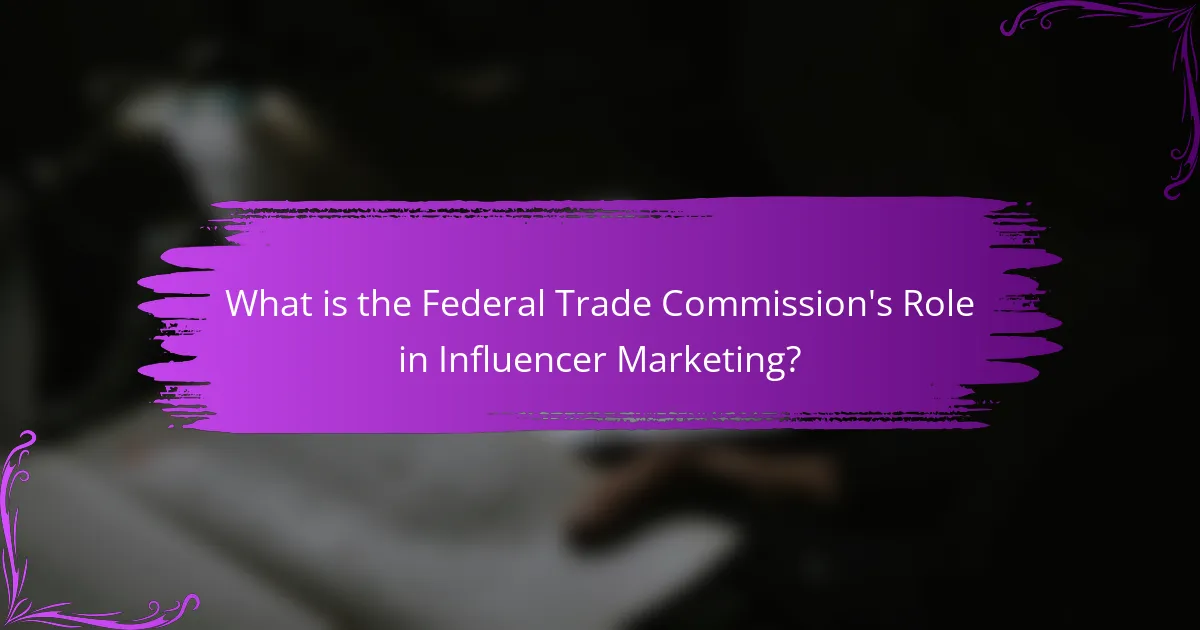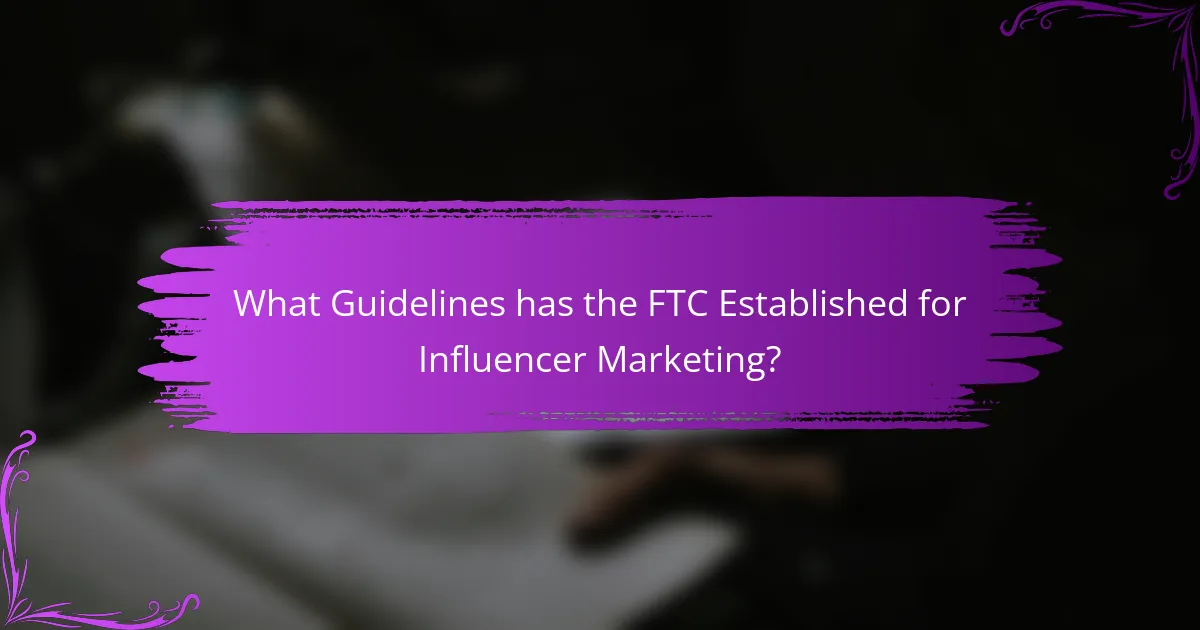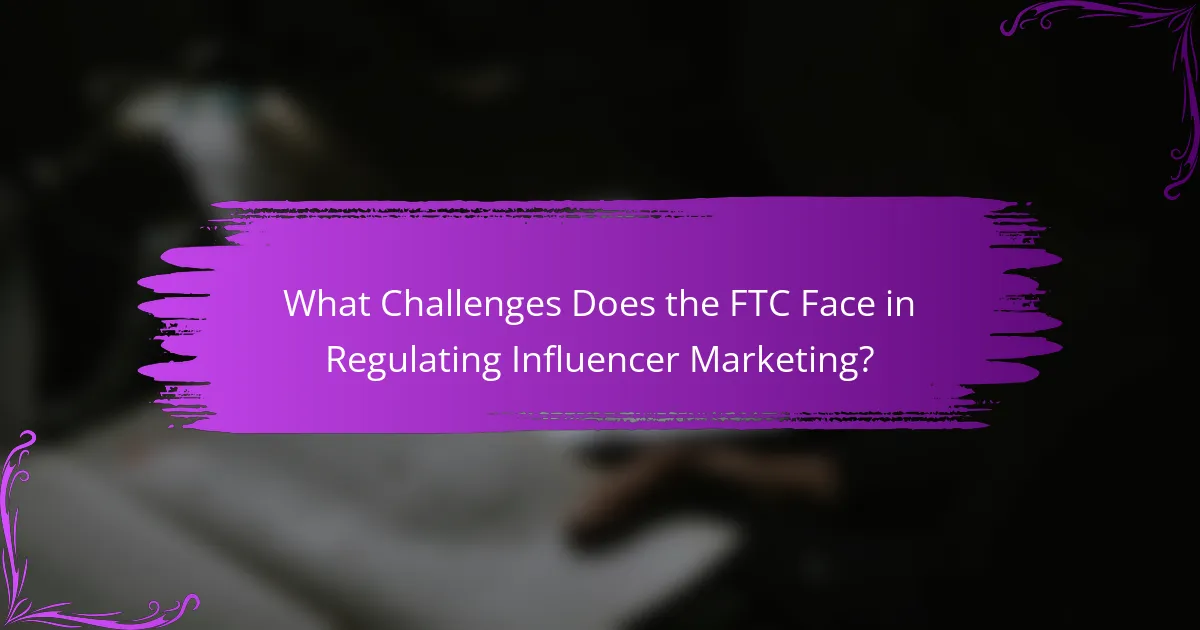
What is the Federal Trade Commission’s Role in Influencer Marketing?
The Federal Trade Commission (FTC) regulates influencer marketing to protect consumers from deceptive practices. The FTC requires influencers to disclose material connections with brands. This includes sponsorships, free products, or any form of compensation. The goal is to ensure transparency in advertising. Influencers must use clear language when making disclosures. Phrases like “ad” or “paid partnership” are recommended. The FTC monitors compliance and can impose penalties for violations. These regulations are outlined in the FTC’s Guides Concerning the Use of Endorsements and Testimonials in Advertising.
How does the FTC define influencer marketing?
The FTC defines influencer marketing as a form of advertising that involves endorsements from individuals who have influence over potential customers. Influencers promote products or services through social media, blogs, or other platforms. The FTC requires that influencers disclose any material connections to brands they promote. This includes payment or free products received in exchange for endorsements. The intention is to ensure transparency and protect consumers from misleading advertising. The guidelines emphasize that endorsements must be truthful and not misleading.
What are the key components of influencer marketing according to the FTC?
The key components of influencer marketing according to the FTC include transparency, disclosure, and authenticity. Influencers must clearly disclose any material connections to brands. This includes paid partnerships, free products, or other incentives. The FTC requires that disclosures be made in a way that is easy for consumers to notice. Disclosures should be placed in close proximity to the endorsement. They must be clear and unambiguous to avoid misleading consumers. The FTC emphasizes that influencers should not use vague terms like “sponsored” without context. This is essential to maintain trust and transparency in marketing practices.
How does influencer marketing differ from traditional marketing?
Influencer marketing differs from traditional marketing primarily in its approach to audience engagement. Influencer marketing leverages individuals with established credibility and a loyal following to promote products. This method relies on personal connections and authenticity, fostering trust with consumers. In contrast, traditional marketing often employs broader, less personalized strategies, such as television ads or billboards. Traditional marketing typically focuses on mass outreach rather than targeted engagement. Studies show that influencer marketing can yield 11 times higher ROI compared to traditional marketing methods. This effectiveness stems from the influencer’s ability to connect with niche audiences on platforms where traditional marketing may not reach effectively.
Why is regulation of influencer marketing important?
Regulation of influencer marketing is important to ensure transparency and protect consumers. Influencers often promote products without disclosing their financial relationships. This lack of disclosure can mislead consumers about the authenticity of endorsements. The Federal Trade Commission (FTC) mandates clear guidelines for influencers to disclose paid partnerships. Research shows that 75% of consumers expect transparency in influencer marketing. Effective regulation builds trust in the marketplace. It also helps maintain fair competition among brands. By enforcing these regulations, the FTC aims to safeguard consumer interests and uphold ethical marketing standards.
What are the potential risks associated with unregulated influencer marketing?
Unregulated influencer marketing poses several potential risks. One major risk is the spread of misinformation. Influencers may promote products without verifying claims, leading to consumer deception. Another risk is the lack of transparency. Without regulations, influencers may fail to disclose paid partnerships, misleading their audience. This can erode trust between consumers and brands. Additionally, unregulated marketing can lead to unethical practices. Influencers might promote harmful products or services, impacting public health and safety. A 2020 study by the Federal Trade Commission highlighted the importance of disclosure in maintaining consumer trust. These risks underscore the need for regulatory oversight in influencer marketing practices.
How can regulation protect consumers in the digital space?
Regulation can protect consumers in the digital space by establishing clear guidelines for online behavior. These guidelines ensure transparency in advertising and marketing practices. For example, the Federal Trade Commission (FTC) enforces rules that require influencers to disclose paid partnerships. This disclosure helps consumers make informed decisions. Additionally, regulation can combat deceptive practices and fraud. By monitoring online platforms, regulators can identify and penalize misleading claims. Studies show that clear regulations increase consumer trust in digital transactions. Trust leads to higher engagement and safer online experiences.

What Guidelines has the FTC Established for Influencer Marketing?
The Federal Trade Commission (FTC) has established specific guidelines for influencer marketing. Influencers must disclose their relationships with brands clearly and conspicuously. This includes using terms like “ad” or “sponsored” in posts. The disclosure should be placed in a way that is easily noticeable. Influencers must ensure that their audience understands the nature of the endorsement. The guidelines apply across all platforms, including social media and blogs. The FTC emphasizes that misleading endorsements can result in penalties. Compliance with these guidelines promotes transparency in advertising practices.
What are the core guidelines set by the FTC for influencers?
The core guidelines set by the FTC for influencers require clear disclosure of material connections. Influencers must inform their audience when a post is sponsored or when they have a financial interest in the product. This includes using clear and conspicuous language. Phrases like “ad” or “sponsored” are recommended. The disclosure should be placed in a way that is easily noticeable. Influencers must not mislead their audience about the nature of their endorsements. These guidelines are designed to promote transparency in advertising. They ensure that consumers can make informed decisions. The FTC emphasizes that failure to comply can result in penalties.
How should influencers disclose their relationships with brands?
Influencers should disclose their relationships with brands clearly and conspicuously. This means using terms like “ad,” “sponsored,” or “partnership” in their posts. The disclosure must be easy to notice and understand. It should be placed at the beginning of the content, not buried in hashtags or comments. The Federal Trade Commission (FTC) guidelines emphasize that transparency is essential. Influencers must ensure that their audience knows when content is paid for. This helps maintain trust and complies with legal requirements. According to the FTC, failing to disclose can lead to penalties. Therefore, proper disclosure protects both the influencer and the audience.
What constitutes adequate disclosure according to the FTC?
Adequate disclosure according to the FTC requires that endorsements be clear and conspicuous. This means that any material connection between the endorser and the brand must be disclosed. Disclosures should be placed in a way that is easily noticeable to the audience. They must be understandable and in plain language. For example, using hashtags like #ad or #sponsored is acceptable, but they should be placed in the same frame as the endorsement. The FTC emphasizes that disclosures should not be buried in fine print or hidden in links. These guidelines help ensure transparency in advertising practices.
How do these guidelines impact brands and influencers?
These guidelines impact brands and influencers by establishing clear standards for transparency in advertising. Brands must disclose paid partnerships to maintain consumer trust. Influencers are required to label sponsored content appropriately. This ensures compliance with Federal Trade Commission regulations. Non-compliance can result in fines or legal action against both parties. Studies show that transparency increases consumer engagement and brand loyalty. By adhering to these guidelines, brands and influencers can foster authentic relationships with their audience. This ultimately leads to more effective marketing campaigns and improved brand reputation.
What are the potential consequences for non-compliance with FTC guidelines?
Non-compliance with FTC guidelines can lead to various consequences. Entities may face significant financial penalties. The FTC can impose fines that reach up to $43,792 per violation. Legal action may also be taken against non-compliant parties. This can result in costly litigation and potential settlement fees. Additionally, non-compliance can damage a brand’s reputation. Public trust may erode if consumers perceive misleading advertising practices. Companies may also face increased scrutiny from regulatory bodies. This could lead to more stringent oversight in future marketing efforts. Overall, the risks of non-compliance can be substantial and far-reaching.
How can brands ensure their influencers adhere to FTC regulations?
Brands can ensure their influencers adhere to FTC regulations by implementing clear guidelines. These guidelines should outline disclosure requirements for sponsored content. Brands should provide training on FTC rules to influencers. Regular audits of influencer content can help maintain compliance. Brands must establish a contract that includes adherence to FTC regulations. Monitoring social media posts for proper disclosures is essential. Brands should communicate openly with influencers about expectations. This proactive approach helps mitigate risks associated with non-compliance.

What Challenges Does the FTC Face in Regulating Influencer Marketing?
The FTC faces several challenges in regulating influencer marketing. One challenge is the rapid evolution of social media platforms. New platforms and features emerge frequently, making it hard to establish consistent guidelines. Another challenge is the diverse nature of influencer marketing itself. Influencers vary in reach, engagement, and content style, complicating regulatory efforts.
Additionally, many influencers may not fully understand disclosure requirements. This lack of awareness leads to unintentional non-compliance with regulations. The FTC also struggles with enforcement across different jurisdictions. Influencer marketing often crosses state and national borders, complicating regulatory oversight.
Moreover, the FTC must balance regulation with innovation. Over-regulation could stifle creativity and growth in the digital marketing space. Lastly, the FTC faces resource limitations. With numerous influencers and brands to monitor, effective enforcement becomes increasingly challenging.
What are the limitations of current FTC regulations?
Current FTC regulations have limitations in effectively addressing influencer marketing practices. They often lack clarity on enforcement standards. Influencers may not fully understand their obligations under these regulations. The guidelines can be vague regarding what constitutes a clear disclosure. This ambiguity can lead to inconsistent compliance among influencers. Additionally, the regulations may not keep pace with evolving digital marketing strategies. There is also limited capability for the FTC to monitor all influencer activities. These factors contribute to challenges in ensuring transparency and accountability in influencer marketing.
How do rapidly changing social media platforms complicate regulation?
Rapidly changing social media platforms complicate regulation due to their dynamic nature and evolving features. These platforms frequently update algorithms, user interfaces, and content policies. Such changes can outpace existing regulations, making compliance challenging. Additionally, the global reach of these platforms creates jurisdictional issues. Different countries have varying laws regarding advertising and consumer protection. This inconsistency complicates enforcement efforts by regulatory bodies. Moreover, the rise of new platforms can introduce unregulated spaces for influencer marketing. This creates gaps in oversight and increases the risk of deceptive practices. As a result, regulators struggle to keep pace with the rapid evolution of social media environments.
What challenges arise in enforcing compliance among influencers?
Challenges in enforcing compliance among influencers include the diverse nature of influencer content and platforms. Influencers operate across various social media channels, each with unique guidelines and audience expectations. This diversity complicates the establishment of a uniform compliance standard. Additionally, many influencers may lack awareness of regulations regarding disclosures and advertising practices. The Federal Trade Commission (FTC) has guidelines, but enforcement can be difficult due to the volume of content produced daily. Moreover, influencers often have varying degrees of influence over their followers, making it challenging to measure the impact of non-compliance. Enforcement actions can also be hindered by jurisdictional issues, as influencers may operate from different regions or countries. Lastly, the rapid evolution of social media trends can outpace regulatory measures, leading to gaps in compliance enforcement.
How can the FTC improve its regulatory approach to influencer marketing?
The FTC can improve its regulatory approach to influencer marketing by establishing clearer guidelines for disclosure. Current regulations may not adequately address the nuances of social media platforms. Enhanced transparency requirements could help consumers better understand the nature of sponsored content. The FTC should consider developing specific rules tailored to different social media formats. This could include mandatory training for influencers on compliance. Regular audits of influencer partnerships would ensure adherence to guidelines. Additionally, the FTC could increase penalties for non-compliance to deter misleading practices. These steps could enhance consumer trust and protect the integrity of influencer marketing.
What best practices can be adopted to enhance transparency in influencer marketing?
Disclosing partnerships clearly is essential in influencer marketing. Influencers should use hashtags like #ad or #sponsored. This practice informs audiences about paid promotions. Providing context about the relationship enhances trust. Transparency builds credibility for both brands and influencers. Clear disclosures comply with FTC guidelines. The FTC has emphasized the importance of such practices in its regulations. Following these guidelines can lead to better consumer relationships and brand loyalty.
How can education and awareness initiatives support FTC regulations?
Education and awareness initiatives can enhance compliance with FTC regulations. These initiatives inform influencers and marketers about the requirements for transparency in advertising. They provide training on proper disclosure practices, which is essential for maintaining consumer trust. Research shows that informed influencers are more likely to adhere to guidelines. For instance, a study by the FTC indicated that clear communication about sponsorships reduces deceptive practices. Additionally, awareness campaigns can reach consumers, helping them recognize and question undisclosed endorsements. This creates a more informed audience that demands accountability from brands and influencers. Overall, education fosters a culture of compliance with FTC standards.
What are some practical tips for influencers and brands to follow FTC guidelines?
Influencers and brands should clearly disclose paid partnerships to comply with FTC guidelines. Use hashtags like #ad or #sponsored to indicate promotional content. Ensure disclosures are easily visible and not buried in lengthy text. Place the disclosure at the beginning of posts for maximum visibility. Avoid vague language; be specific about the nature of the relationship. Use plain language that is easily understood by the audience. Regularly review FTC guidelines to stay updated on compliance requirements. Engaging in transparency builds trust with followers and enhances brand credibility.
The Federal Trade Commission (FTC) plays a crucial role in regulating influencer marketing to protect consumers from deceptive practices. This article outlines the FTC’s guidelines requiring influencers to disclose material connections with brands, ensuring transparency in advertising. Key components of influencer marketing, such as authenticity and compliance, are discussed alongside the importance of regulation to mitigate risks like misinformation and lack of transparency. Additionally, the article examines challenges the FTC faces in enforcement and offers best practices for influencers and brands to adhere to these regulations.



